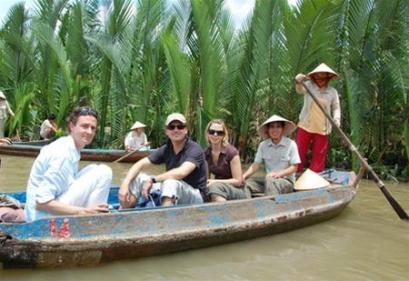
| Does VN spent too much in the wrong place to market tourism? | |||
The Ministry of Culture, Sports and Tourism (MoCST) seems to be delighted with the recent two advertising campaigns for Vietnam’s tourism on the BBC and 27 taxi London in the UK. However, many travel companies doubt the effects of these campaigns. London taxis or buses?
In mid-2008, the Government allowed the Ministry of Culture, Sports and Tourism to use up to 30 billion dong (US$1.7 million) from the Fund for Investment, Trade and Tourism Promotion for the first time. However, the ministry unexpectedly assigned its International Cooperation Department (ICD) to be in charge of using this money, rather than VNAT, the National Administration for Tourism. ICD, which had never before been involved in tourism promotion, didn’t do anything in the second half of 2008, though it had the funds in hand.
Now, according to ICD, Vietnam has signed a 20,000 UK pound contract to put the image of a Vietnamese girl in an ao dai and Ha Long Bay on the bodies of 27 London taxis for six months. This campaign began on July 1, 2009.
This campaign originated from an experiment several years ago, when the Vietnamese Embassy in the UK received around 7000 pounds from some overseas Vietnamese. With that sum, the embassy arranged for ads to be put on ten London taxis for three months. Impressed by the effectiveness of this advertising mode, the embassy introduced it to tourism agencies.
Hanoitourist’s director Luu Duc Ke isn’t impressed. Taxis are small and run fast, he said. In his view, it is more effective to advertise on double-decker buses. Ke also questioned why Vietnam launched this campaign at a time when spreading A/H1N1 outbreak and the global economic crisis are hammering the world tourism industry? Meanwhile, an official from MoCST announced that a Vietnamese Culture Day program will be held in the UK in September 2009.
Some fail to see a plan
A senior official from the Vietnam National Administration of Tourism (VNAT) commented that “to date, the we have been advertising without any plan. Tourism Association Chairman Nguyen Phu Duc is very anxious because he feels the situation will just get more confused if we pour more money into advertising without a long-term strategy.”
Focus Travel Co. Director Dang Bao Hieu agrees. “The biggest weakness of tourism management agencies is the lack of a long-term promotion strategy. Whenever they have funds, they launch a lot of advertising campaigns. When they run out of money, they stop.”
“They don’t conduct research and surveys to understand why they need to advertise Vietnam’s tourism in this market and not in others, or what are the most effective forms of advertisement, the right scale and duration. With modest funds, promotion campaigns often don’t last long enough for our message to sink in.”
Consultants say the BBC is for the rich
Though the International Relations Department has stressed the global reach of a tourism advertising campaign on BBC in May and June, which cost more than $200,000, many tourism firms and experts disagree.
Speaking at a meeting with many officials from the VNAT and Vietnamese travel companies in Hanoi on July 24, a well-known travel consultant from Europe said: “It is very expensive to advertise on the BBC. There are many wiser and more effective forms of advertising.”
Deputy director Nguyen The Vinh of the big Saigontourist firm said that Vietnam’s budget for tourism promotion is only a small fraction of the spending by many Southeast Asian countries.
Baron Ah Moo, the head of Indochina Land’s Hotels and Resorts Division, commented that there is so much information on the BBC that the advertising message can get lost. As advertising on the BBC is very expensive, Vietnam should only choose this channel if it has a lot of money to spend; otherwise its investment will be like salt flung on the ocean.
Moo recommended that Vietnam, bearing in mind its limited funding for tourism promotion, should invest in tourism websites. In case it still wants to advertise on foreign TV channels, it should choose entertainment channels.
Hanoitourist’s director Luu Duc Ke cited an expert from Spanish International Cooperation Agency as recommending against advertising on the BBC or CNN. The expert recently helped VNAT develop a tourism marketing plan for 2008-2015. He stated that advertising on the BBC and CNN is not highly effective because these are leading channels for information on news, politics and economics. The audience of these channels doesn’t pay much attention to tourism information.
“American and European visitors mainly search for information from online forums, tourism magazines and websites of travel companies. Meanwhile, citizens of many Asian countries are not fluent in English,” Moo said.
Hapro Tourism Company’s director Phung Van Khai said that the BBC is also good, but it is as not effective as Discovery, National Geographic and Star Sports, the TV channels that Thai Airways, Korean Air and the tourism management agencies of Malaysia and Singapore choose.
Vietnam’s tourism to go CNN
Though the effectiveness of advertising campaigns on BBC and London taxis is not yet established, ICD has announced that it has reached agreement with CNN on another marketing campaign. Department head Nguyen Van Tinh said that the total expenditure for two months of advertising on CNN is $250,000. The images of Vietnam will be introduced on CNN Asia, including Japan.
“We await the Finance Ministry’s approval to sign a contract with CNN in September,” Tinh said.
In late 2007, Vietnam introduced its famous landscapes such as Ha Long Bay, Hue, HCM City and Hoi An on CNN. The funding for that campaign nearly $300,000. Tinh said that the upcoming advertising campaign on CNN will be similar. | |||
| VietNamNet/TBKTSG/Tuoi Tre |

